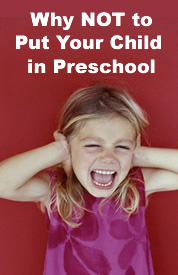The Truth About Early Formal Academics (revisited, with lots of new research links)
Posted by homeschoolmentormom on February 8, 2012
We’ve all heard these sayings about education: “the earlier the better.” “Let’s start our kids early, and give them an advantage.” “Early readers do better in school,” and so on. But are any of these widely held ideas true? Is there any proof to back up these sayings? The truth is, not one single study that has shown that early formal academics are beneficial to normal young children from loving homes. No study has shown any long-term benefit to early formal academics, and there is no proof that learning to read earlier is better than learning later. However, there is considerable proof that early academics can cause harm.
Consider this: Until the last 30-40 years or so, most children weren’t introduced to the alphabet in a formal lesson type of way until Kindergarten–and even then, often only the upper case letters! Nowadays, many children are taught the alphabet in preschool—or even before (as toddlers.) The results have not been encouraging. In fact, the more the public schools demand of young children, the worse America’s children do—academically and behaviorally. I don’t think this is a coincidence. Look at the evidence for yourself:
-More and more children are being diagnosed with learning disorders. Many developmental experts believe this is due to the recent “push down” in preschool/school curriculum, combined with a lack of time for play and other more traditional preschool-type activities. On average, 1 in 6 children are diagnosed with some type of developmental disability, a 15% increase between 1997-2008 (this is mostly due to attention deficit disorder.)
–School/academic preschool often presents unique problems for boys: Boys are more likely to be diagnosed with attention deficit disorder than girls are, probably because boys naturally have higher activity levels than girls do, and thus have a harder time sitting still (or listening, or being quiet, etc…). Additionally, in general, boys mature later than girls, and often are not ready for formal academics.
-Literacy and literary knowledge continues to decline. The web is abuzz with commentators questioning/lamenting: “Is reading dead?” Even Steve Jobs is quoted as saying, “It doesn’t matter how good or bad the product is, the fact is that people don’t read anymore. Forty percent of the people in the U.S. read one book or less last year.”
But there is hope…Most commentators conclude that reading is not dead–it’s just changing. Less people are reading the great literary works, and more are reading in short snippets–tweets, texts, and blogs versus reading real literature. If that is true, reading is in its death throes as far as I’m concerned. Thank-goodness homeschooolers are still keeping it alive! (For more, read the Literary Crisis or read the shocking statistics about reading in the U.S.)
-Studies have shown that children whose preschool experience was child-initiated did better in elementary school. From Moving up the Grades: Relationship between Preschool Model and Later School Success, by Rebecca A. Marcon, University of North Florida: “.….By the end of their sixth year in school, children whose preschool experiences had been academically directed earned significantly lower grades compared to children who had attended child-initiated preschool classes. Children’s later school success appears to have been enhanced by more active, child-initiated early learning experiences. Their progress may have been slowed by overly academic preschool experiences that introduced formalized learning experiences too early for most children’s developmental status” (emphasis added; read the entire article HERE.)
-Many parents/schools are “miseducating” young children. From “Academics, Literacy, and Young Children,” Childhood Education, Spring 2000, by Elizabeth M. Nel: Important points: “Miseducation…(It) puts a child at risk for psychological damage (Werner & Strother, 1987); what is worse, it is apparently for no good reason, since the benefits of early reading instruction are relatively insignificant. …Therefore, with respect to literacy, developmentally appropriate preschool academics do not involve formal reading instruction, but rather they promote print awareness (Kontos, 1986) by exposing young children to letters, words, and numbers in meaningful contexts (Lesiak, 1997).…Reading to children is one of the best ways to model literacy skills (Bus, Van Ijzendoorn, & Pellegrini, 1995). Reading should not be limited to a set story-time, but rather should be shared with children throughout the day.”
-There is no advantage to learning to read early: From Rush Little Baby: How the Push for Infant Academics Might Actually be a Waste of Time-or Worse, by By Neil Swidey, October 28, 2007, The Boston Globe: (Watch the video, then scroll down for the article. It’s long, but worth the time; and it’s not only about infants.) Quote: “A classic study in the 1930s by noted researcher and Illinois educator Carleton Washburne compared the trajectories of children who had begun reading at several ages, up to 7. Washburne concluded that, in general, a child could best learn to read beginning around the age of 6. By middle school, he found no appreciable difference in reading levels between the kids who had started young versus the kids who had started later, except the earlier readers appeared to be less motivated and less excited about reading. …”Many efforts to teach a child to read before 4 or 5 years of age are biologically precipitate and potentially counterproductive for many children. ‘The danger in pushing reading too early, Wolf says, is that, for many children, we may be asking them to do something for which their brains are not ready. You run the risk of making a child feel like a failure before they’ve even begun,’ she says. And while the gains from early reading may fade away, the damage from being tagged a slow kid at a young age has the potential to be permanent.’” …..”Study after study shows the best thing parents can do for their children is give them a nurturing, rich, vibrant environment, reading to them often and exposing them to lots of language in organic ways. Reading books out loud is most effective when the parent uses the words on the page to help the child make connections to his or her own world.” …”As long as parents are exposing their children to a nurturing, vibrant environment, reading to them regularly, and speaking with them intelligently, they should feel free to put the flash cards away.”
. -Harm is the result when children enter an academic first-grade program too soon: This is from a surprising source–The Longevity Project, a twenty year project at the University of Riverside: (My summary): According to the study, these children had adolescent problems, problems later in life, and “an earlier DEATH!” Now THAT’S scary!! (NOTE: The study results regarding early learning are toward the end of the video, linked above.)
My conclusion: We should relax and enjoy the preschool years! Following your children’s lead when it comes to early academics is the wisest choice. Watch your children for signs of interest and natural learning, so that you neither push your children, nor hold them back. Remember, our goal should be to find “balance”….we do this by addressing the needs of the whole child (spirit, mind, and body) and by using an individualized, developmentally appropriate approach. This is more than just a “good idea”; it is a necessity, since every child is different and develops at his/her own, God-given time-table.
Finally: It’s important to know that most, if not all of the studies that are highly promoted as showing the “benefits” to early formal education have been done on “at risk” or “disadvantaged” children, NOT children from average American homes. Furthermore, the studies showed that any “advantage” the children gained was short-lived, and disappeared altogether by the third grade. Furthermore, the studies ignored the negative effects of early formal education, such as those listed above (and more.) Still not convinced? Check out the links below, and the following books:
Links About Readiness:
Best Homeschooling (ALL these articles are great!)
Preschooling at Home: My article, What Your Preschooler Really Needs (lots of good resources on this site.)
Is Five Too Soon to Start School? (from the U.K.)
Should Preschools be all work and no play? (This highlights a lot of the research I mention above in a practical way. Remember, as homeschoolers, we don’t have to get our children ready for Kindergarten; we can make our Kindergarten ready for them, instead.)
Paula’s Archives (another great collection of articles)
Books about Readiness/Early Learning:
Endangered Minds: Why Children Don’t Think-and What We Can Do About It, Jane M. Healy, PH.D., Simon and Schuster Paperbacks, 1990.
Home Grown Kids, Raymond and Dorothy Moore*
Miseducation: Preschoolers At Risk, David Elkind*
Einstein Never Used Flashcards, Kathy Hirsh-Paskek, Roberta Michnick Golinkoff
The Three R’s by Ruth Beechick*
(Remember, there is a whole chapter on the issue of readiness in Homepreschool and Beyond.)
© 2010, 2012 Susan Lemons all rights reserved.






Leave a comment